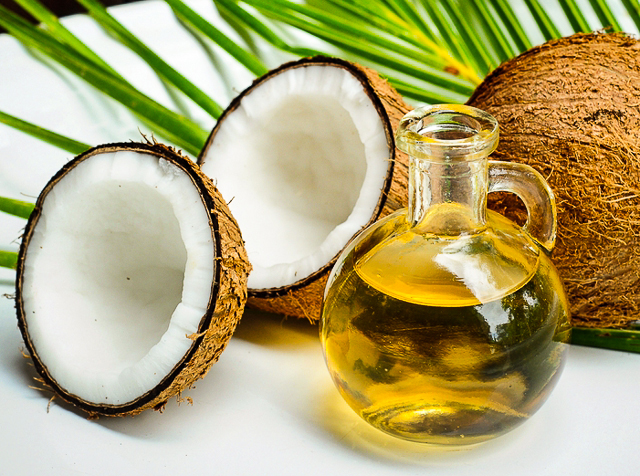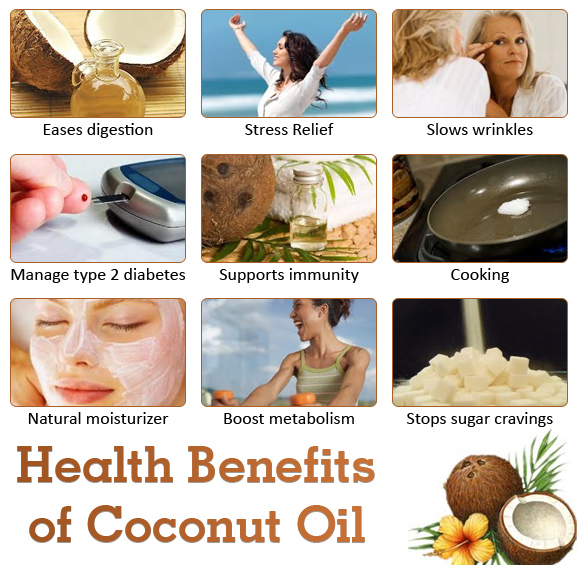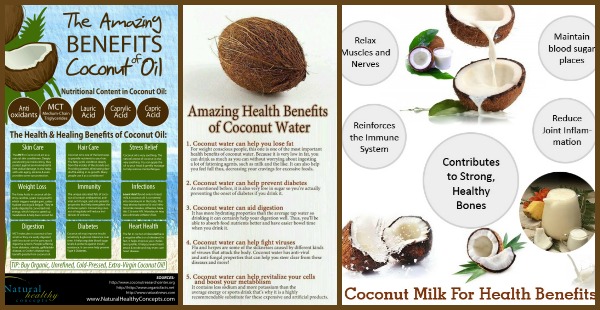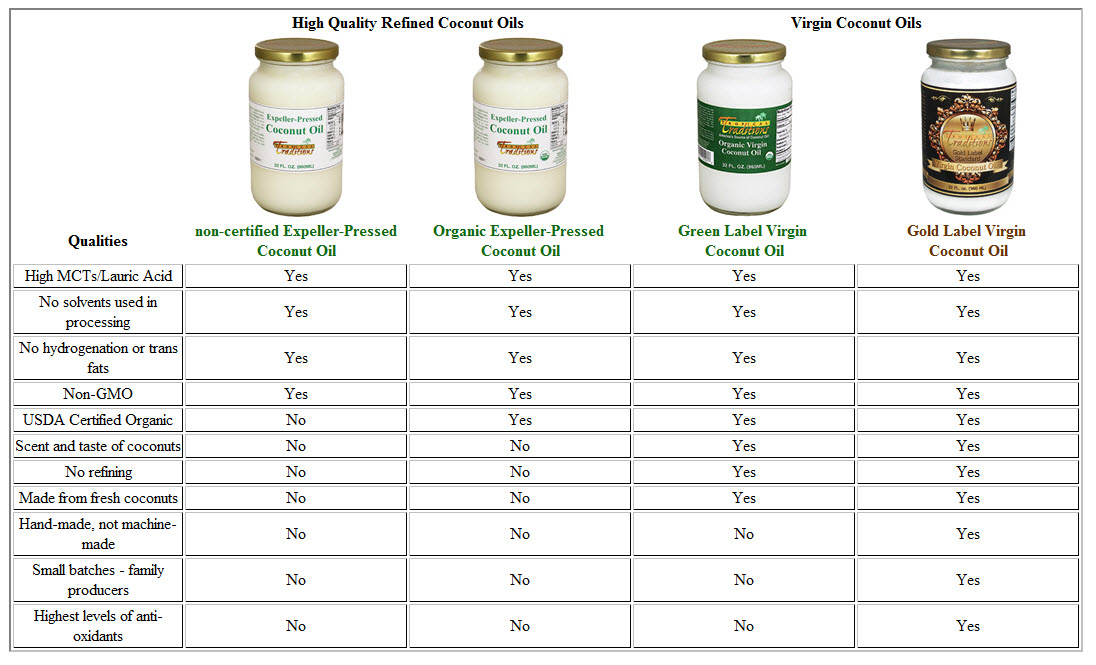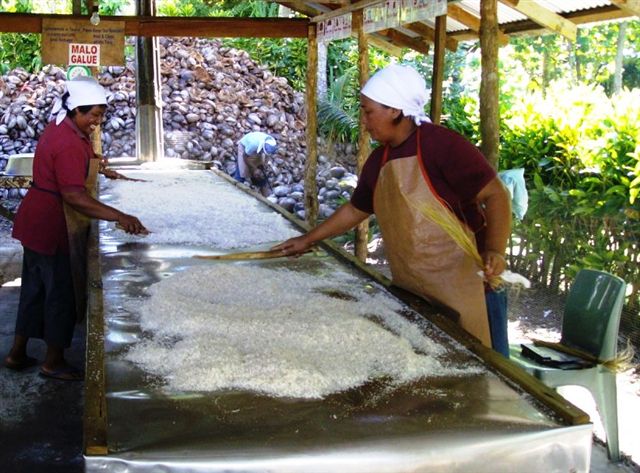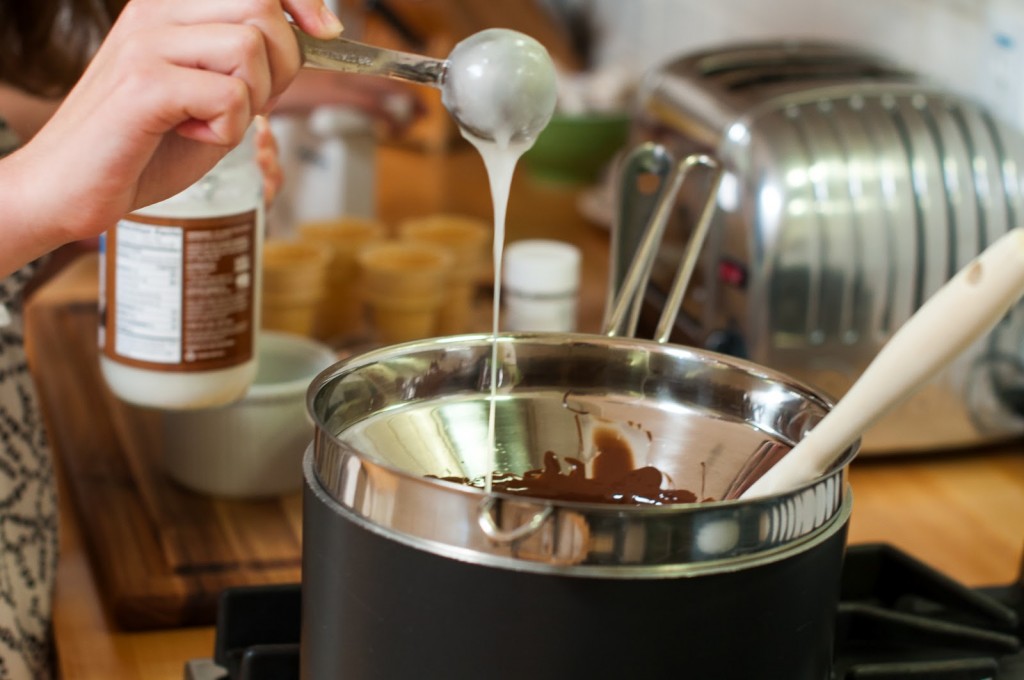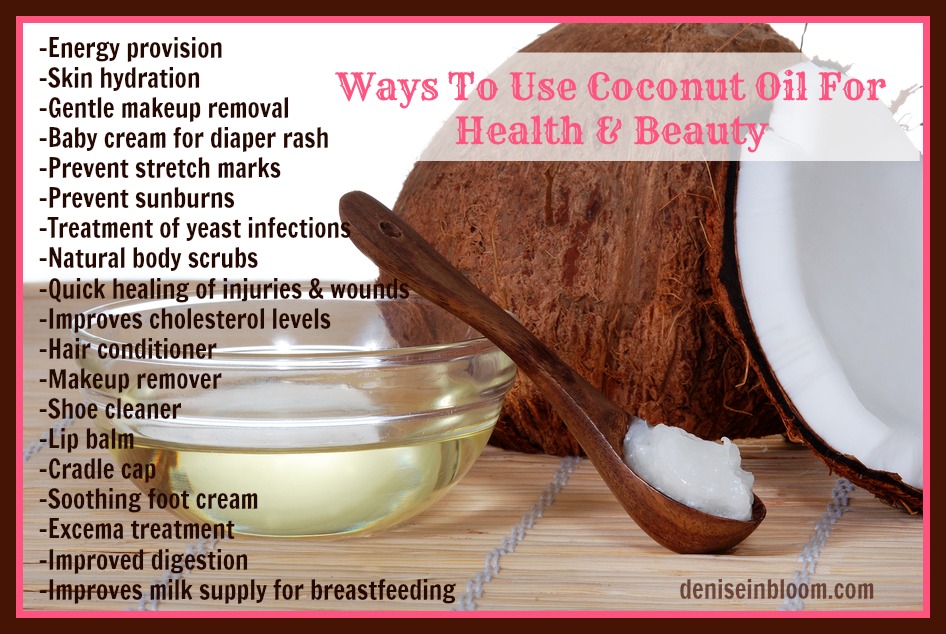53 Uses for Coconut Oil
So, What Is Coconut Oil?
Coconut oil is an edible oil, like olive or macadamia oil, extracted from the kernel or meat of mature coconuts. The oil is made up of around 90% saturated fat, 6% monounsaturated fat, and 3% polyunsaturated fat. Unlike other highly saturated and unsaturated fats, coconut oil is mostly made up of medium chain fatty acids (MCFAs). The saturated fat content makes coconut oil very heat-stable and enables a long shelf life. It is well-known for its healing, anti-inflammatory properties and its metabolism-boosting medium chain tryglycerides. It has many uses from dietary, medical and industrial applications.
Benefits Of Coconut Oil
Coconut oil has many benefits, from being directly associated with specific positive health effects to acting as an aid in certain body functions. I’ve read through dozens of papers, articles and blog posts and collated the following list of known/claimed benefits.Helps relieve symptoms associated with chronic fatigue syndrome. I’ve have also seen a lot of reports of coconut oil health benefits from those suffering from hypothryroidism, as coconut oil helps boost metabolism and raise body temperatures to promote thyroid health. Restricting carbohydrates and increasing coconut oil in the diet has also led many to report losing weight with coconut oil. Candida sufferers also report health benefits with coconut oil as research now confirms, and those suffering from various skin diseases are also seeing tremendous health benefits by applying coconut oil directly on the skin. The benefits of coconut oil for healthy hair are also well known, and other healthy benefits of coconut oil included fighting off bacterial infections and viruses. Coconut oil is also increasingly being seen to benefit athletes and fitness trainers giving them an advantage in sustaining energy levels longer without drugs or stimulants.
How Does It Work?
Have you ever heard of lauric acid? It’s a compound with amazing health promoting properties. It contains anti fungal, antibacterial, antiviral properties that boost the immune system. Coconut oil fat is nearly 50% lauric acid, which is converted by the body into monolaurin and makes coconut oil effective in treating many bacterial and fungal infections such as candida, athlete’s foot, measles, influenza, and hep C. Another source of monolaurin is human breast milk, go figure!
Another reason coconut oil has so many benefits is because unlike most other fats and oils, it is comprised of medium-chain fatty acids, (MCFA’s), which are smaller fat molecules metabolised in the liver and immediately absorbed and converted into energy, kind of like glucose but without the insulin spike. Other fats and oils are made up of long chain fatty acids, or long-chain triglycerides, which are larger molecules that are difficult for your body to break down and are mainly stored as fat. The MCFA’s in coconut oil actually boost your metabolism and help your body use fat for energy, which can lead to weight loss, Type 2 diabetes risk reduction, increase in energy, accelerated healing and improved immunity. When it comes to your skin, coconut oil is very hydrating and keeps skin’s connective tissues strong, which prevents sagging and wrinkles.
Types Of Coconut Oil
Refined coconut oil
• Made from dried coconut, also known as copra; the standard end product made from dried kernel (meat) is RBD oil, which stands for refined, bleached and deodorised. The reason the oil has to undergo this process is that the dried copra is not fit for consumption and the oil needs to undergo processes to filter our impurities and to make it more stable; it’s a pretty common way to mass-produce coconut oil.
• Because it’s refined it’s fairly tasteless and doesn’t smell like coconut; it can withstand higher cooking temperatures before it reaches its smoke point; great for deep-frying foods without the flavor of coconut.
• It’s not as great as the virgin, completely raw coconut oil but still has the same beneficial medium chain fatty acids; from what I read, it’s very close in its nutritional value to virgin coconut oil so it’s more about the extraction method and what chemicals have been applied.
• Most of the coconut oils available in grocery stores and vitamin stores are refined unless they specifically state otherwise; not all refined oils are created equal so try to get good quality, non-hydrogenated (yep, even coconut oil can be hydrogenated or partially hydrogenated but mainly in tropical, Asian countries), and refined using natural, chemical free process like steam or diatomaceous earth.
• Refined oil is great if you’re on the budget as it’s usually cheaper. It’s also good for things which require lots of oil like deep-frying, using it as a bath oil or in soaps, or using it as a body moisturizer.
Unrefined coconut oil
• Usually labelled as ‘virgin’ or ‘extra-virgin’, this coconut oil is made from the first pressing of fresh, raw coconut using mechanical means without the addition of any chemicals; depending on the extraction method, the flavor can be mild to very intense (more heat exposure during extraction, more coconut flavor in the oil).
• Good raw, unrefined, virgin coconut oil should have a very mild coconut flavor and scent.
• The difference between ‘virgin’ and ‘extra virgin’ is, well, pretty much none existent as far as I’ve researched, it’s more of a marketing trick to get you to pay more.
• Virgin, unrefined oil is more superior to refined coconut oil.
Extraction methods
Cold-pressed, expeller-pressed or centrifuged are methods of extracting oil from dry or fresh coconut and can be used for both refined and unrefined varieties. All methods can create a good, healthy oil. Expeller-pressed and cold-pressed don’t always mean ‘raw’ as sometimes these oils are heated to rather high temperatures during the extraction process, which is not a problem as coconut oil is a highly stable fat and will not go rancid. It does however mean that the flavor will be more coconutty. If you want a more mild and delicate coconut oil, look out for a centrifuged oil which is less likely to be exposed to heat during extraction.
Buying Coconut Oil
There are many brands and types of coconut oil and they vary in price depending on the source, production method, packaging and the marketing team. Super expensive doesn’t always mean the best, although it does often indicate the quality of ingredients and the purity. I always recommend to try a few brands and to find out as much as you can about the manufacturing process. Personally I really like Niulife coconut oil because the guy who started the company actually invented a natural expelling method they still use today and they are a fair trade and family owned business who make good products. However there are many great brands out there and regardless of where you are, here are a few things to look out for:
Color – white color when it’s solid and colorless when liquid, any discoloration might mean contamination and inferior quality.
Aroma and flavor – virgin, unrefined coconut oil should smell and taste like coconut but should not be overpowering and strong, if it smells roasted or smokey it means it’s been exposed to a lot of heat and it might not retain as many nutrients; and if it’s odorless and neutral tasting then it’s most likely refined and treated.
Price – the coconut oil in most stores can get quite pricey and doesn’t always mean superior product. It’s always a good idea to buy in bulk as the oil is stable and will last for at least 12 months. You can try a few different brands and make sure you like the smell and taste before you commit to buying a big batch. You can also share the shipping costs with friends and family and save even more money.
Storing Coconut Oil
Coconut oil can be stored out of the fridge, away from direct sunlight, for up to two years. It will stay liquid in temperatures above 25C (75F) and will turn into butter and solid texture in lower temperatures or if refrigerated. If the oil is solid and you need to use it in a liquid form, apply low level heat and it will transform very quickly.
How To Use Coconut Oil?
There are hundreds of ways you can use coconut oil – in cooking, as part of your skincare routine, as part of flu and cold treatment, or to rub on cuts and bruises. I’ve put together a few examples of how you can use it.
As far as how much coconut oil you should consume, most recommend 3-4 tablespoons of coconut oil for adults per day to achieve optimal results. It would be less for kids and those of you starting out with coconut oil or saturated fats in general. If you’ve been following a low fat diet and only now decided to transition to a higher fat intake, I would recommend to gradually build up the consumption of fat to avoid the initial diarrhea you might experience along the way.
Coconut oil as food
• I use coconut oil in cooking as it’s very heat-stable. I fry and deep-fry in it, rub it on my roast meats, stir-fries and sauces. It’s really good for Asian cooking as its flavor is very complimentary.
• It is a solid most of the time at room temperature or when refrigerated and is therefore a great substitute for butter or margarine and can be used for dips, spreads, in baking and desserts. Use 1 to 1 ratio when substituting other oils or butter for coconut oilIt can even be used to make mayonnaise, I would used a good quality refined coconut oil for that.
• Add a couple of teaspoons to smoothies, juices, tea or coffee.
• Refrigerate it and eat as is by scrapping some with a teaspoon. The taste is slightly sweet and subtle, it really is quite nice and doesn’t have that oily texture you might expect, more like white chocolate.
• Mix some coconut oil with cacao & honey for a quick energy boost before a workout.
You can get both edible and inedible coconut oils in stores.The edible form of coconut oil is usually refined,bleached and deodorized. Virgin coconut oil
is considered the best as it is low in carbs and forms a great source of nutrition.Coconut oil that has been derived from copra as the starting is usually unsuitable for consumption and can be applied externally only. So,if you are purchasing coconut oil, make sure you confirm that is suitable for consumption to prevent to unwanted issues.
For external uses, expeller pressed or other types of refined coconut oil will work, but for internal use, an unrefined virgin coconut oil is best. This book provides more information about the benefits of coconut oil and the difference in the types of coconut oil.
Hydrogenated Coconut Oil
In most cases, the coconut oil that is refined, bleached and deodorized is hydrogenated fully or completely. This practice is common in tropical areas as the melting point of coconut oil is about 76 degrees F. The coconut oil retains its natural solid state in colder conditions.One common issue with coconut oil is the hydrogenation process itself.
Coconut oil contains very little unsaturated oil which makes it hard to hydrogenate. Once it is hydrogenated, however, it contains traces of transfatty acids.
53 Uses for Coconut Oil
1. Taken supplementally for daily energy
2. On the skin as a basic lotion
3. In homemade lotion bars for soft, smooth skin
4. In homemade deodorant or deodorant bars
5. In cooking as a great oil with a high smoke point. Great for baking, stir-frys or as a dairy free replacement to butter.
6. As an eye-makeup remover
7. As a cloth diaper safe diaper cream (just rub on baby’s bottom)
8. In making your own Remineralizing Toothpaste
9. To prevent stretch marks during pregnancy
10. To support healthy thyroid function
11. In homemade Mayo without the high PUFA vegetable oils
12. To help increase sun tolerance and avoid burning
13. As a naturally SPF 4 sunscreen
14. In homemade lotion recipes
15. To get rid of cradle cap on baby- just massage in to head, leave on for a few minutes and gently rinse with a warm wash cloth
16. Topically to kill yeast or yeast infections
17. As a delicious tropical massage oil
18. It’s high Lauric acid and MCFA content helps boost metabolism
19. A tiny dab rubbed on your hands and then through hair will help get rid of friz
20. As an intensive nighttime facial moisturizer
21. Mixed with equal parts sugar for a smoothing body scrub (use in the shower)
22. Rubbed on lips as a natural chap stick
23. Topically, can help skin heal faster after injury or infection
24. As an incredibly intensive natural conditioner- Rub into dry hair, put a shower cap on and leave for several hours
25. On feet to fight athlete’s foot or toe fungus
26. In place of Lanolin cream on nursing nipples to sooth irritation (also great for baby!)
27. Can help sooth psoriasis or eczema
28. With apple cider vinegar as a natural treatment for lice that actually works
29. In natural Homemade Sunscreen
30. In a filling and energy boosting Brain Powder Smoothie
31. Rub coconut oil on the inside of your nose to help alleviate allergy symptoms
32. There is some evidence that coconut oil helps digestion and may even kill intestinal parasites or yeast
33. Mix a tablespoon with a tablespoon of chia seeds for an all-day energy boost (do NOT take this at night!)
34. Can help improve insulin levels
35. Oil pulling with coconut oil and a drop of oregano oil helps improve gum health
36. Can help improve cholesterol ratios
37. Blend a tablespoon into hot tea to help speed recovery from cold or flu
38. In Homemade Natural Bug-Off Lotion Bars
39. As a replacement for vegetable oils in any recipe
40. After initial heat is gone, can help speed healing of sunburn
41. Is an immediate source of energy when eaten and isn’t stored as fat
42. As a natural personal lubricant that won’t disturb vaginal flora
43. As a naturally antibacterial skin cream
44. As a natural shave cream and after shave lotion
45. When used consistently on skin it can help get rid of cellulite
46. To season cast iron skillets
47. It’s anti-inflammatory properties can help lessen arthritis
48. Can reduce the itch of mosquito bites
49. Can help resolve acne when used regularly
50. Can be rubbed into scalp daily to stimulate hair growth
51. I’ve used in kids ears to help speed ear infection healing
52. A small amount can be rubbed into real leather to soften and condition (shiny leather only… test a small area first)
53. By itself as a great tanning oil
